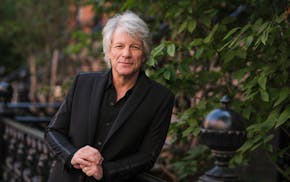Nine months after leaving as head of the state Pollution Control Agency and promising not to take a job that presented a conflict of interest, Brad Moore is playing an important role in a proposed mining project that will need his former agency's approval.
Moore now works for Barr Engineering of Minneapolis and is a point person for a Crow Wing Power Co. proposal in northern Minnesota to mine one of the largest high-grade deposits of manganese in North America.
Though Moore is barred by state law from personally appearing before the PCA board or participating in proceedings of the agency for one year, his involvement as a government relations and public affairs expert comes as the project enters an intricate series of tests to show state officials that manganese can be mined from the site without polluting nearby lakes.
Moore said he has been careful to follow state law regarding conflicts of interest and was abiding by "the letter of the law and also the spirit."
His role with the mining project illustrates the often-delicate line that PCA commissioners and other state agency heads face as they step between regulatory jobs and the industries they regulate.
When he was appointed to head the PCA by Gov. Tim Pawlenty in 2006, Moore succeeded Sheryl Corrigan, whom critics accused of being too accommodating to industry and at one point of allowing business interests to weaken a plan to restrict mercury emissions from power plants.
During his time at the PCA, Moore was praised for changing the perception that the agency was too cozy with business. When he left last November, Moore promised that his new job at Barr Engineering would not lead to any conflicts. "Much of the work is going to be outside of Minnesota in other jurisdictions, and you're not going to see me before the Pollution Control Board anytime soon," he said.
"We were surprised to see that Brad was working on stuff in the state after his comments," said Paul Aasen, interim executive director of the Minnesota Center for Environmental Advocacy, which is monitoring the project but has not taken a position on it.
Reed Larson, the PCA's north central region manager, acknowledged that Moore's new role had the potential to be awkward. "It's kind of funny to see the former commissioner sitting across the table," he said. "[We] analyze the project on its own merits."
Currently manganese must be imported. It is used in steel production, and also is seen as valuable for reducing power plant emissions, as well as for use in water purification and in rechargeable batteries. The small 5-acre site in Emily, Minn., in north central Minnesota, has long been eyed for mining.
The Crow Wing Power proposal is being touted as more environmentally friendly than past proposals. The process, known as bore hole extraction, would involve drilling holes into the site and then using pressurized water to recover the manganese.
A first-phase demonstration project is being monitored by the PCA, but an initial permit request for the project is not expected to come before the agency's board until early next year. The mining proposal also must be approved by the Department of Natural Resources, where Moore also served as an assistant commissioner.
At public meetings in June and July, Moore provided an overview of the regulatory approvals the project would need, including environmental permits from his former agency.
"He keeps me informed on everything that's going on," said George Pepek, the mayor of Emily.
Doug Connell, Barr Engineering's president, said he contacted Moore while he was the PCA commissioner about working for Barr because he sensed Moore's job "was not going the way he wanted." Moore said that he never granted Barr Engineering any favors while heading the agency. Since late 2005, the company has had contracts with the PCA totaling just over $1 million to work on water quality projects.
Moore said he began working on the Emily project about a month after leaving the PCA. He said most of his work involved "citizen engagement" and helping to steer the project through the state, local and federal regulatory process, which will include getting around a city ordinance that prohibits the mining project. "I help ensure that the documents that are submitted to agencies pass muster," he said.
As he works on the project, Moore said, he has not touted his former role as PCA commissioner to citizen groups in an attempt to influence their opinions. "I never, when I'm in public meetings, talk about where I've been," he said, although he said that he is occasionally introduced as a former agency commissioner.
In his new job, Moore has also met with environmental groups about the mining project -- a role that has not gone unnoticed.
Aasen, from the Minnesota Center for Environmental Advocacy, said Moore met with the group earlier this year to explain the project -- a move that Aasen said was an attempt to get the group to endorse it. "Anytime you move public to private or private to public ... as a regulator, it raises questions," he said.
Mike Zipko, a spokesman for Cooperative Mineral Resources, the Crow Wing Power subsidiary that is overseeing the project, downplayed Moore's role and possible influence with his former agency. "Brad was not the reason that Barr got hired," he said.
Moore is not the only former PCA commissioner who has remained actively engaged with the agency.
Chuck Williams, whose term as commissioner from 1991 to 1996 was the longest of any PCA head, is an independent environmental consultant for several mining companies and attends PCA board meetings monthly. Peder Larson, who succeeded Williams as commissioner from 1996 through 1998, is a Minneapolis environmental attorney whose work includes ethanol projects. Larson said he steered clear of the agency's board for at least a couple years after leaving his job but has since appeared before it.
Larson said many consultants and lawyers who come before the PCA representing business have previously worked for the agency as engineers or division managers. Knowing people at the agency, he said, can be a slight advantage. "It's not based on whether they'll do you a favor," he said. "It's more like a client says, 'I've got to talk with this person at the agency; can you tell me about him?'"
Chris Nelson, the PCA's mining sector manager, said he has met with Moore about the mining project and that it was not surprising that Moore and other former agency officials work for firms with projects before the agency.
"If you have an environmental, technical background and you decide to leave state government ... you're not going to go work and do music videos or something," he explained.
Mike Kaszuba • 651-222-1673
Complex stories of migration are among the finalists for the Women's Prize for Fiction
Olympian Kristi Yamaguchi is 'tickled pink' to inspire a Barbie doll

After 4 decades in music and major vocal surgery, Jon Bon Jovi is optimistic and still rocking
Rom-com author Emily Henry knows the secret to having a healthy relationship with love

